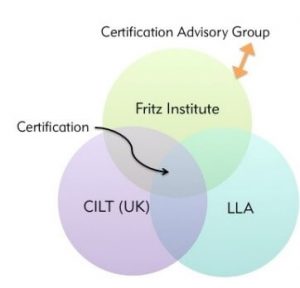 Since their creation in 2006, the Humanitarian Logistics Certification Programmes (HLCP) have been an unprecedented instance of sustained inter-agency and private-public collaboration.
Since their creation in 2006, the Humanitarian Logistics Certification Programmes (HLCP) have been an unprecedented instance of sustained inter-agency and private-public collaboration.
The need for training and the professional recognition of logisticians was identified as a key issue for humanitarian organisations during the Humanitarian Logistics Conferences of 2003 and 2004. The Fritz Institute became the catalyst for the development of the HLCP as a result of this identified need. Key humanitarian logistics players were brought together to define the content and objectives of the programme, alongside experts in commercial logistics training, to design and deliver the results. The desire at the outset was to develop a cohort of certified and competent logistics and supply chain practitioners. This would allow them to be skilled in the technical and management disciplines required and able to apply those skills in any humanitarian context.
The programmes continue to be guided and overseen by the Certification Advisory Group (CAG), which is comprised of senior logistics officers from UN agencies, international NGOs, and the Red Cross / Red Crescent Movement. It is coordinated through a three-way partnership: the project is overseen by the Fritz Institute; the Chartered Institute of Logistics and Transport is the awarding organisation for the qualifications; and Logistics Learning Alliance (LLA) is the partner for the delivery of the programmes.
To date, the cohort of qualified logistics and supply chain professionals is over 1200 strong. This covers the areas of Logistics, Supply Chain Management and Medical Logistics areas. We are currently completing around 20 graduates per month. The programmes were revised and updated in 2017 so they remain current and relevant to the situations that confront aid agencies on a daily basis.

Recent Comments